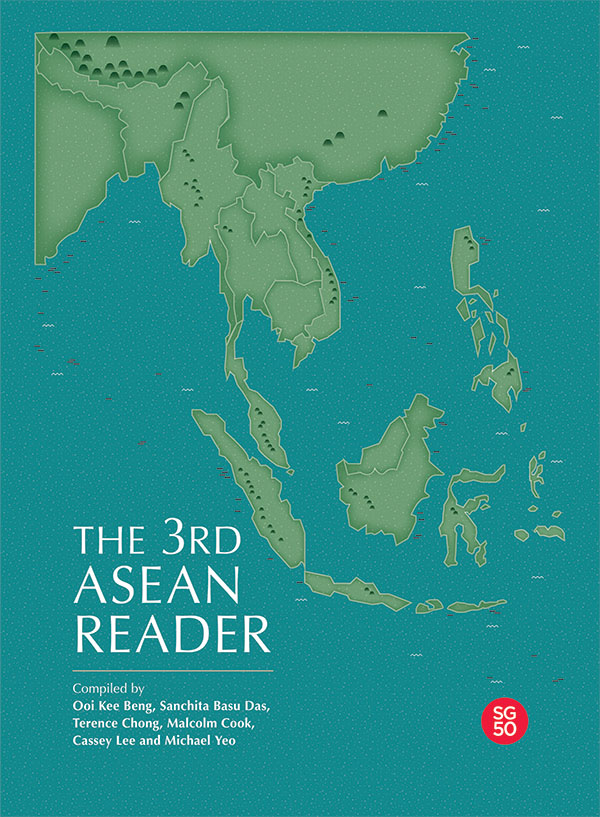Book contents
- Frontmatter
- Contents
- Preface
- Forewords to the First and Second ASEAN Reader: ASEAN: Conception and Evolution
- Forewords to the First and Second ASEAN Reader: ASEAN: The Way Ahead
- Forewords to the First and Second ASEAN Reader: New Challenges for ASEAN
- SECTION I ASEAN: THE LONG VIEW
- SECTION II COUNTRY ANALYSES
- SECTION III COMPARATIVE ANALYSES OF THE REGION
- Southeast Asian Societies
- The Southeast Asian Economy
- Southeast Asian Politics
- SECTION IV INTERNATIONAL DEVELOPMENTS
- SECTION V INSTITUTIONS OF ASEAN
- SECTION VI ASSESSING ASEAN'S INTERNAL POLICIES
- ASEAN Political Security Community
- ASEAN Economic Community
- ASEAN Socio-Cultural Community
- SECTION VII ASSESSING ASEAN'S EXTERNAL INITIATIVES
- Section Introduction by
- 59 Trust-Building in Southeast Asia: What Made it Possible?
- 60 South China Sea: Glacial Progress Amid On-Going Tensions
- ASEAN Processes
- ASEAN's Major Power Relations
- SECTION VIII SOUTHEAST ASIA: PERIPHERAL NO MORE
- Bibliography
- The Contributors
- The Compilers
60 - South China Sea: Glacial Progress Amid On-Going Tensions
from SECTION VII - ASSESSING ASEAN'S EXTERNAL INITIATIVES
Published online by Cambridge University Press: 22 June 2017
- Frontmatter
- Contents
- Preface
- Forewords to the First and Second ASEAN Reader: ASEAN: Conception and Evolution
- Forewords to the First and Second ASEAN Reader: ASEAN: The Way Ahead
- Forewords to the First and Second ASEAN Reader: New Challenges for ASEAN
- SECTION I ASEAN: THE LONG VIEW
- SECTION II COUNTRY ANALYSES
- SECTION III COMPARATIVE ANALYSES OF THE REGION
- Southeast Asian Societies
- The Southeast Asian Economy
- Southeast Asian Politics
- SECTION IV INTERNATIONAL DEVELOPMENTS
- SECTION V INSTITUTIONS OF ASEAN
- SECTION VI ASSESSING ASEAN'S INTERNAL POLICIES
- ASEAN Political Security Community
- ASEAN Economic Community
- ASEAN Socio-Cultural Community
- SECTION VII ASSESSING ASEAN'S EXTERNAL INITIATIVES
- Section Introduction by
- 59 Trust-Building in Southeast Asia: What Made it Possible?
- 60 South China Sea: Glacial Progress Amid On-Going Tensions
- ASEAN Processes
- ASEAN's Major Power Relations
- SECTION VIII SOUTHEAST ASIA: PERIPHERAL NO MORE
- Bibliography
- The Contributors
- The Compilers
Summary
The situation in the South China Sea during 2013 remained essentially unchanged. Tensions between the claimants continue to fester, fuelled by rising nationalist sentiment over ownership of the disputed atolls, the lure of potentially lucrative energy resources under the seabed, spats over access to valuable fisheries in overlapping zones of maritime jurisdiction and moves by most of the claimant states to bolster their territorial and sovereignty claims by issuing new maps, conducting military exercises and launching legal challenges. Indonesian Foreign Minister Marty Natalegawa observed that the South China Sea was characterised by a ‘sense of anarchy’.
The primary axis of contention this year has been China and the Philippines. Bilateral relations nosedived in 2012 when superior Chinese maritime assets forced Manila to concede control of Scarborough Shoal. In January 2013, the Philippines angered China by unilaterally challenging its expansive claims in the South China Sea — represented by the so-called nine-dash line — at the United Nation's (UN) International Tribunal of the Law of the Sea (ITLOS). China went on to accuse the Philippines of illegally occupying atolls in the South China Sea, being confrontational and encouraging the United States to “meddle” in the dispute; Manila responded that China's “massive” military presence around the shoals within the country's 200 nautical miles exclusive economic zone (EEZ) posed “serious challenges” to regional stability. Beijing even withdrew an invitation to Philippine President Benigno Aquino to attend the 10th ASEAN-China Expo in Nanning in August 2013 because he refused to withdraw the UN legal challenge. As that case proceeds — even without China's participation — China and the Philippines will remain estranged. In contrast, relations between Vietnam and China were relatively cordial.
A resolution to the dispute looks further away than ever. Because the claimants have dug in their heels over perceived territorial and maritime rights, the compromises and concessions that would be required to achieve a legal or negotiated settlement are currently out of reach. Indeed the political climate has become so ill-tempered that even the proposal to shelve the sovereignty disputes in favour of joint development of resources — which China gives lip service to — is unworkable.
Notwithstanding this bleak, and widely shared, assessment, few observers envisage a major war in the South China Sea.
- Type
- Chapter
- Information
- The 3rd ASEAN Reader , pp. 317 - 320Publisher: ISEAS–Yusof Ishak InstitutePrint publication year: 2015



